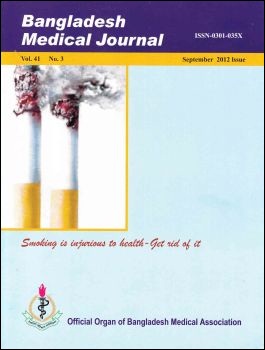Early Outcome of Off-pump Coronary Artery Bypass Graft Surgery in Patients with Multivessel Coronary Artery Disease
DOI:
https://doi.org/10.3329/bmj.v41i3.18951Abstract
As there have been appreciable bodies of evidence supporting the theoretical and practical advantages of off-pump coronary artery bypass grafting (OPCAB) over the conventional coronary artery bypass graft (CABG) to avoid the harmful effects of cardiopulmonary bypass (CPB), many cardiac surgeons are using OPCAB as an effective alternative to conventional CABG. This study performed in National Institute of Cardiovascular Diseases (NICVD) evaluated the early surgical outcomes of OPCAB in terms of mortality and major post-operative morbidities and compared them with that of conventional CABG. Total 120 patients with multi-vessel coronary artery disease were allocated into two groups: a) 60 patients who underwent OPCAB and b) another 60 patients who underwent conventional CABG between January 2009 and December 2011. The sex and mean age. A reduced level or complete cessation of sweating can be caused by a variety of factors affecting sweat glands directly or indirectly through alterations in their nerve supply. The most common presentation is the syndrome of heal intolerance with or without features of dysautonomia. An acquired idiopathic form of generalized anhidrosis is characterized by loss of sweating in the absence of any neurological features or destruction of sweat glands. ldiopalhic acquired generalized anhidrosis is a very rare condition in which the pathogenesis is still unknown. Cholinergic urticaria has been associated with some cases of this acquired idiopathic form of generalized anhidrosis.Distributions of patients were similar among two groups. Smoking, diabetes mellitus, hypertension and dyslipidemia were major risk factors. All co-morbid conditions were homogenously distributed between the two groups. Majority of the patients had triple vessel disease. Nearly three-quarter (73.3%) of patients in OPCAB group and 80% in conventional CABG group received 3 grafts (p=0.470. The mean total operative time (258±39.5 minutes versus 306±44.8 minutes; p<0.001), intubation times (7.6±0.3 versus 16.3±0.5 hours; p<0.001), blood losses (377.8±22.3 ml vs. 602.0±18.9 ml, p<0.001); requirements for blood and blood products (689.7±21.1 vs. 1199.3±34.5 ml, p < 0.0010); intensive care unit stays (31.7±0.9 hours versus 41.6±1.5 hours; p<0.001) and hospital stays (6.2±0.2 days versus 8.3±0.3 days; p<0.0010) were all significantly shorter in the OPCAB group. OPCAB is a safe and effective procedure for patients with multi-vessel coronary artery disease and is associated with reduced morbidity and mortality. However, large randomized studies with long-term follow-up may show the real benefits of OPCAB compared with CABG on CPB.
DOI: http://dx.doi.org/10.3329/bmj.v41i3.18951
Bangladesh Medical Journal 2012 Vol.41(3): 8-14
Downloads
150
205

